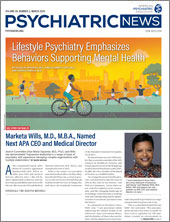If you would have asked me what is sports psychiatry at this time last year, I would not have been able to answer you. When I share with others that I am seeking certification in sports psychiatry, I am often met with that very same question.
It all started when another resident mentioned pursuing an elective in this field. It piqued my interest; however, I assumed this would not be an appropriate fit for me as I was never much of an athlete. Over the next few months, I kept thinking about the concept and the niche field of sports psychiatry. One day I began scrolling through LinkedIn, and I saw a post featuring sports psychiatrists. I thought—this was the time; it never hurts to obtain more information. I reached out to two of the featured sports psychiatrists who kindly provided me with sound advice and mentorship, and I began my own research to learn more.
According to the founder of sports psychiatry as a field, J.H. Massimino, the primary role of sports psychiatrists must be a clinical one: to prevent, diagnose, and treat the psychiatrically related medical issues confronting the athlete. Again, I thought, “How is that different from what psychiatrists already do?” However, I also recognized the very aspect of psychiatry I love most—its nonformulaic and evidence-based approach.
Yes, I was still seeking my niche in psychiatry. I am fascinated by the biopsychosocial perspective on what society may consider to be high achieving individuals, which could include but is not limited to successful leaders, business executives, and athletes. Characteristics they often all possess include ambition, discipline, dedication, and, for some, the pressure of feeling that failure is not an option. That’s when I realized the answer. Not only do we as psychiatrists possess the biopsychosocial perspective that allows us to study recovery, aspects of competition, and the relationship between psychological functioning and performance, but we are also medical doctors who specialize in diagnosis, treatment, and therapeutic interventions. I was distraught to learn that one of the leading causes of death among student athletes is suicide, so I decided to dive in—head first—as an advocate and as a psychiatrist in the field.
The
International Society for Sports Psychiatry was founded in 1994 to advance the specialty of sports psychiatry, and members are offered a “Certificate of Additional Training in Sports Psychiatry” after completing all aspects of its curriculum satisfactorily. After securing a mentor, completing this certificate is my first step in the journey to becoming a sports psychiatrist. In the future, I hope this field is recognized as an official subspecialty by the American Board of Psychiatry and Neurology. Until then, I hope to continue learning through mentorship, postresidency clinical experience, and scholarly achievement in the field.
Whether you are in residency, fellowship, or the early- or even mid-career stage, I encourage you to ask yourself two questions: Am I still looking for my niche in psychiatry, and am I interested in learning more about sports psychiatry? If you answer yes to both questions, I urge you to read more about sports psychiatry and utilize an online network to reach out to leaders in the field. Next, I recommend finding a mentor. And finally, never stop learning. Even if you choose not to practice in the realm of sports psychiatry, I am a firm believer that education is never wasted, and you can serve as an advocate to encourage athletes to seek mental health care. ■

